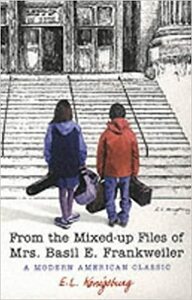Take a photo of a barcode or cover
Vi la reseña de este libro en un tiktok, a la chica le había gustado bastante y por lo que decía me intereso, la idea de escaparse y "vivir" en un museo me pareció genial, pero esperaba mucho más, tanto de la estadía en el museo y de los archivos secretos.
adventurous
hopeful
lighthearted
I loved this book as a kid, and I love it all over again listening to the audiobook with my kids. Don’t skip the author’s anniversary reflection at the end - it’s a gem, too.
adventurous
funny
lighthearted
medium-paced
Strong character development:
Yes
Loveable characters:
Yes
I loved this book so much. I don't remember much about it as I had read it about a year before I started goodreads. I love mystery, I love things that include children as children are not like how adults are in BOOKS I mean as it is very different in real life. But in books it is mostly going to be romance and I hate that stuff. I had lots of fun seeing the adventure change before my eyes. I twas frankly... AWESOME. I loved it like crazy.
I hadn't revisited this book since I read it in the third grade, and I don't think I realized until now what a profound impact it had on me. I saw myself in Claudia then, and in some ways I still do now.
Besides the obvious appeal of running away to live in an art museum and sleeping in a sixteenth-century bed with hangings and learning something new about art every day and solving the mystery of a statue that's almost 500 years old... what oldest child DOESN'T sympathize with Claudia's vague sentiments of 'injustice' at home and exasperation at having the most 'grown up' responsibilities around the house? I remember being ten years old and yearning to copy Claudia's plan exactly, except that I lived too far from New York City to pull it off (to this day if I don't want to leave a museum I am tempted to try hiding in a bathroom stall to stay past closing time).
At the same time, though, with time and distance I've also come to appreciate some of the things that Mrs. Basil E. Frankweiler says to the children that, as a child myself, did not stick with me on that first read. Such as when the (extremely-type-A) Claudia insists that you should learn one new thing every day, and she responds:
This is a lesson that took me most of my 16 years of formal schooling to learn. Could have learned it in third grade, if I'd been reading harder. Instead, I chose to learn (or retain, anyway) that I could always just take money from the basin of a fountain if I ran away from home, and that you shouldn't wash your reds and blues with your whites. Go figure.
The first time I read this book, I loved it because it was about an ordinary (but extremely smart and determined) girl (like me!) having an adventure that set her apart. This time, I loved the framing of the narrative and the way the story--like so many things, Mrs. Frankweiler tells us--is really about the journey. The answer to the great mystery is something different (and means something different) to each character.
This book is timeless. Ten year olds everywhere should continue to read it, even though (as the afterword casually mentions) the world has changed since Claudia and Jamie Kincaid ran away to live in the Metropolitan Museum of Art. But also, I think, anyone who knows or loves or cares about a young adult might want to read it, too. It'll give you a lot to talk about together.
Besides the obvious appeal of running away to live in an art museum and sleeping in a sixteenth-century bed with hangings and learning something new about art every day and solving the mystery of a statue that's almost 500 years old... what oldest child DOESN'T sympathize with Claudia's vague sentiments of 'injustice' at home and exasperation at having the most 'grown up' responsibilities around the house? I remember being ten years old and yearning to copy Claudia's plan exactly, except that I lived too far from New York City to pull it off (to this day if I don't want to leave a museum I am tempted to try hiding in a bathroom stall to stay past closing time).
At the same time, though, with time and distance I've also come to appreciate some of the things that Mrs. Basil E. Frankweiler says to the children that, as a child myself, did not stick with me on that first read. Such as when the (extremely-type-A) Claudia insists that you should learn one new thing every day, and she responds:
I think you should learn, of course, and some days you must learn a great deal. But you should also have days when you allow what is already in you to swell up inside of you until it touches everything. And you can feel it inside you. If you never take time out to let that happen, then you just accumulate facts, and they begin to rattle around inside of you. You can make noise with them, but never really feel anything with them. It's hollow.
This is a lesson that took me most of my 16 years of formal schooling to learn. Could have learned it in third grade, if I'd been reading harder. Instead, I chose to learn (or retain, anyway) that I could always just take money from the basin of a fountain if I ran away from home, and that you shouldn't wash your reds and blues with your whites. Go figure.
The first time I read this book, I loved it because it was about an ordinary (but extremely smart and determined) girl (like me!) having an adventure that set her apart. This time, I loved the framing of the narrative and the way the story--like so many things, Mrs. Frankweiler tells us--is really about the journey. The answer to the great mystery is something different (and means something different) to each character.
This book is timeless. Ten year olds everywhere should continue to read it, even though (as the afterword casually mentions) the world has changed since Claudia and Jamie Kincaid ran away to live in the Metropolitan Museum of Art. But also, I think, anyone who knows or loves or cares about a young adult might want to read it, too. It'll give you a lot to talk about together.
adventurous
funny
hopeful
informative
lighthearted
mysterious
fast-paced
Plot or Character Driven:
A mix
Strong character development:
Yes
Loveable characters:
Yes
Diverse cast of characters:
No
Flaws of characters a main focus:
Complicated



